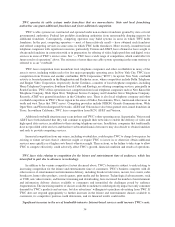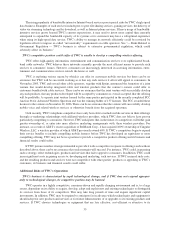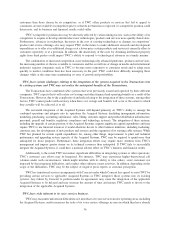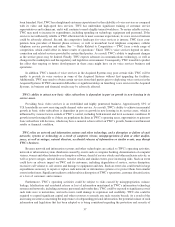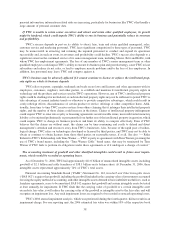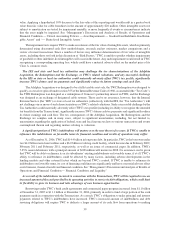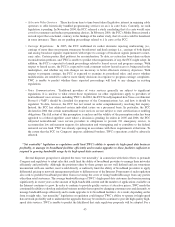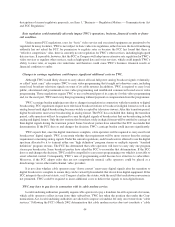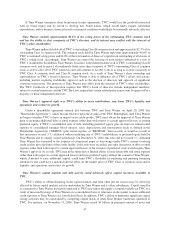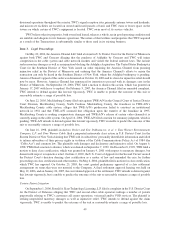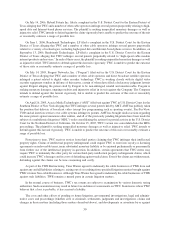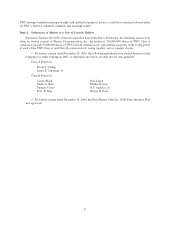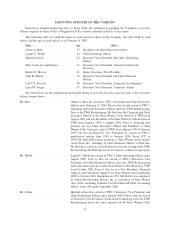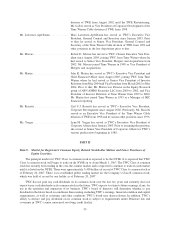Time Warner Cable 2006 Annual Report Download - page 49
Download and view the complete annual report
Please find page 49 of the 2006 Time Warner Cable annual report below. You can navigate through the pages in the report by either clicking on the pages listed below, or by using the keyword search tool below to find specific information within the annual report.description of current regulatory proposals, see Item 1, “Business — Regulatory Matters — Communications Act
and FCC Regulation.”
Rate regulation could materially adversely impact TWC’s operations, business, financial results or finan-
cial condition.
Under current FCC regulations, rates for “basic” video service and associated equipment are permitted to be
regulated. In many localities, TWC is not subject to basic video rate regulation, either because the local franchising
authority has not asked the FCC for permission to regulate rates or because the FCC has found that there is
“effective competition.” Also, there is currently no rate regulation for TWC’s other services, including high-speed
data services. It is possible, however, that the FCC or Congress will adopt more extensive rate regulation for TWC’s
video services or regulate other services, such as high-speed data and voice services, which could impede TWC’s
ability to raise rates, or require rate reductions, and therefore could cause TWC’s business, financial results or
financial condition to suffer.
Changes in carriage regulations could impose significant additional costs on TWC.
Although TWC would likely choose to carry almost all local full power analog broadcast signals voluntarily,
so called “must carry” rules require TWC to carry video programming that it might not otherwise carry, including
some local broadcast television signals on some of its cable systems. In addition, TWC is required to carry local
public, educational and government access video programming and unaffiliated commercial leased access video
programming. These regulations require TWC to use a substantial part of its capacity for this video programming
and, for the most part, TWC must carry this programming without payment or compensation from the programmer.
TWC’s carriage burden might increase due to changes in regulation in connection with the transition to digital
broadcasting. FCC regulations require most television broadcast stations to broadcast in digital format as well as in
analog format until digital broadcasting becomes widely accepted by television viewers. After this transition period,
digital broadcasters must cease broadcasting in analog format. The FCC has concluded that, during the transition
period, cable operators will not be required to carry the digital signals of broadcasters that are broadcasting in both
analog and digital format. Only the few stations that broadcast solely in digital format will be entitled to carriage of
their digital signals during the transition period. Some broadcast parties have asked that the FCC reconsider that
determination. If the FCC does so and changes the decision, TWC’s carriage burden could increase significantly.
TWC expects that, once the digital transition is complete, cable operators will be required to carry most local
broadcasters’ digital signals. TWC is uncertain whether that requirement will be more onerous than the carriage
requirement concerning analog signals. Under the current regulations, each broadcaster is allowed to use the digital
spectrum allocated to it to transmit either one “high definition” program stream or multiple separate “standard
definition” program streams. The FCC has determined that cable operators will have to carry only one program
stream per broadcaster. Some broadcast parties have asked the FCC to reconsider that determination. If the FCC
does so and changes the decision, TWC could be compelled to carry more programming over which it is not able to
assert editorial control. Consequently, TWC’s mix of programming could become less attractive to subscribers.
Moreover, if the FCC adopts rules that are not competitively neutral, cable operators could be placed at a
disadvantage versus other multi-channel video providers.
It is not clear whether cable operators may “down convert” must-carry digital signals after the transition to
digital broadcasts is complete to ensure they can be viewed by households that do not have digital equipment. If the
FCC interprets the relevant statute, or if Congress clarifies the statute, with the result that such down conversion is
not permitted, TWC could be required to incur additional costs to deliver the signals to non-digital homes.
TWC may have to pay fees in connection with its cable modem service.
Local franchising authorities generally require cable operators to pay a franchise fee of five percent of revenue,
which cable operators collect in turn from their subscribers. TWC has taken the position that under the Com-
munications Act, local franchising authorities are allowed to impose a franchise fee only on revenue from “cable
services.” Following the FCC’s March 2002 determination that cable modem service does not constitute a “cable
44


